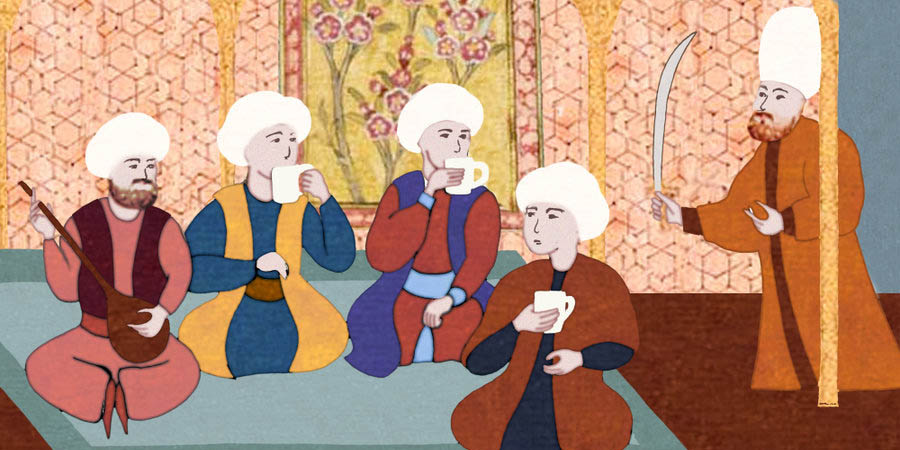Add description, images, menus and links to your mega menu
A column with no settings can be used as a spacer
Link to your collections, sales and even external links
Add up to five columns
Add description, images, menus and links to your mega menu
A column with no settings can be used as a spacer
Link to your collections, sales and even external links
Add up to five columns

Coffee Drinkers Decapitated in 1633
May 17, 2018 3 min read
Coffee Drinkers Decapitated in 1633
Coffee: A History of Controversy and Popularity
Coffee is one of the most beloved beverages worldwide, enjoyed by millions every day. Its rich history, however, is filled with controversy and intrigue, especially during the 17th century.
The Early Days of Coffee
Coffee's journey began in Ethiopia in the 15th century, from where it spread to Arabia. It became a popular drink among Sufi monks, who valued its ability to keep them awake during long nights of prayer and meditation.
Coffee's Introduction to Europe
In the 16th century, coffee reached Europe, quickly gaining popularity among intellectuals and artists. Coffeehouses became social and political hubs, often viewed as threats to the established order.
The Ottoman Empire's Coffee Ban
In 1633, Sultan Murad IV of the Ottoman Empire took drastic measures against coffee. He believed that coffeehouses fostered dissent and that coffee, as a stimulant, made people less obedient. Consequently, he banned coffee, along with smoking and alcohol, under penalty of death.
Sultan Murad IV personally enforced the law, disguising himself and patrolling the streets of Istanbul. Coffee drinkers caught in the act faced immediate execution, typically by beheading.
The Resilience of Coffee Culture
Despite the severe penalties, coffee remained popular. Murad's successors were more lenient, reducing the punishment for coffee consumption to beatings or being sewn into a leather bag and thrown into a river for repeated offenses. Nonetheless, the Turkish people continued to indulge in their beloved beverage.
Coffee's Spread and Continued Controversy
As coffee spread to Europe, it faced opposition from various quarters. Physicians warned against its supposed health risks, while monarchs and tyrants argued that it was harmful to both body and soul. The real fear, however, was political. Coffeehouses were places where people gathered to discuss ideas, potentially fueling dissent and revolution.
In France and America, coffeehouses played significant roles in the planning of revolutions. In Germany, Frederick the Great tried to switch his subjects from coffee to beer, and in England, King Charles II briefly shut down all coffeehouses, fearing their seditious influence.
Coffee's Enduring Popularity
Despite these challenges, coffee's popularity only grew. It became central to social and political life, influencing cultural and historical movements worldwide. Today, coffee continues to be a symbol of social interaction and intellectual exchange.
Modern Coffee Culture
Coffee remains a staple in daily life, from morning routines to social gatherings. Local coffee shops are buzzing with activity, serving as modern-day hubs for business meetings, casual conversations, and cultural discussions.
Conclusion
For contemporary coffee lovers, the challenges faced by early coffee drinkers in the Ottoman Empire highlight the enduring appeal and resilience of this beloved beverage. So, relax and enjoy a cup of Weaver’s superb French Roast Coffee or exquisite Espresso Blend Coffee, knowing that coffee's rich and controversial history has shaped the vibrant culture we enjoy today.
Additional Facts About Coffee
- Coffee is the second most traded commodity globally, after oil.
- The United States is the largest consumer of coffee, followed by Brazil and Germany.
- There are over 100 different types of coffee beans, each with unique flavors.
- Coffee can be brewed in various ways, including drip, pour-over, French press, and espresso.
- Coffee is a good source of antioxidants, which help protect the body against damage from free radicals.
- Coffee can improve alertness, concentration, and physical performance.
- Coffee consumption is linked to a reduced risk of type 2 diabetes, Parkinson's disease, and Alzheimer's disease.
Next time you enjoy a cup of coffee, take a moment to appreciate its long and storied history. Remember, coffee is more than just a beverage—it's a symbol of hope, creativity, and human connection.
Subscribe
Sign up to get the latest on sales, new releases and more …
